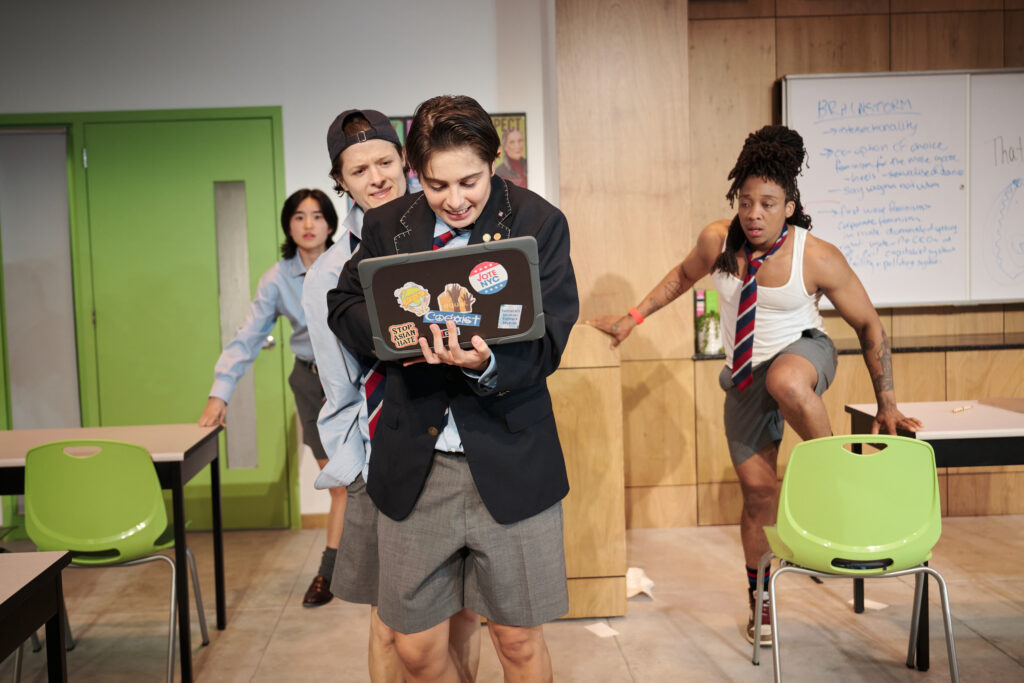Playing with Gender, Losing the Argument
BY CHRISTOPHER BYRNE
In today’s world, generic ideology, pandering to an audience’s presumed biases, and excesses of energy often replace solid dramaturgy. When they do, the result is often merely a polemical exercise replete with ideological triggers but making little sense as theater.
Such is the case with Trophy Boys, now at MCC. The play has arrived with much fanfare, touting its supposed daring nature, as the playwright Emaneulle Mattana has insisted that the four affluent boys from a prep school be played by female or non-binary actors. All very well and good, if this seemed like more than a gimmick. Instead, we have off-the-shelf caricatures of boys—gay, jock, preppy, brainy—acting exactly as you would expect from having seen any number of teen angst plays, movies or TV shows. Mattana gives us no complexity and no deeper motivations for the characters. While the play is promoted as “satire,” perceiving it as such depends on effectively playing to the biases of the audience, a risky plan for a playwright.

In her program note, Mattana says, “Gender is learnt.” [sic] There’s the first flaw in the argument. Gender is inherent to the individual; gender expression is codified in different cultures established norms. These are deeply entrenched, modeled and internalized, arguably limiting, and in the current world a source of conflict—on both individual and societal levels. Mattana doesn’t explore this, seeming to assume that casting differently gendered actors playing stock characters is enough to make the point. It is not.
The play is set in a room at a girls’ school as the boys team prepares for a championship debate. They are given one hour to craft arguments to a statement. “Feminism has failed women. Affirmative.” They are not allowed outside research—computers or phones—yet suddenly they are talking about “third-wave feminism.” Really? This is what 17-year-old boys can expound upon extemporaneously? It’s a long time since my own private school days, but this doesn’t ring true.

Okay, but just when there might be a dramatic theme to be developed along those lines, Mattana throws a sensationalist twist into the tale, revealed when the boys cheat on the no research rule. Suddenly the play veers off into another direction entirely, and, wow, does it get confusing. Are they concerned about winning and getting into great schools or even their futures as politicians? Are they betraying one another after four years of having each other’s backs? How is the information from years ago just coming up now? Weren’t they together when these events happened? The narrative becomes forced and chaotic, and whatever is going on, the boys are not preparing for a debate, as the clock winds down. They decide just to “wing it.” The deeply cynical conclusion they reach is that a cogent argument is irrelevant; it’s all about the presentation. Yet even that—which is potentially an important piece of social criticism—is tossed off and not developed. Throughout, Mattana takes no intellectual responsibility for structuring her arguments, so why should we care?
Director Danya Taymor, who did such a great job with John Proctor is the Villain on Broadway, and whose work on The Outsiders approached genius, can’t seem to give this material any focus. She knows how to put believable teenagers on the stage, but here allows the actors merely to indicate presumed behavior. There’s an unexplained dance break, and the tone goes from manic to menacing in a hard shift that leaves the audience befuddled, though that’s the fault of the play.
The cast fine, but the performances are limited by the material and, as noted, indications of stereotypical types of male, teenage gender expression, at least as Mattana sees it. Louisa Jacboson (Marian in The Gilded Age) seems to be having a good time as Jared and plays the generic preppy very well. Jared at one point empties a backpack to show the trappings of unearned affluence—a Louis Vuitton wallet, gold watch, etc.—but this is another superficial signal, a to–easy gag. Other than complaining “I love women” and trying to defend toxic behavior, Jacobson, who seems to be having a good time, doesn’t have enough to work with to give Jared any dimension. Esco Joyléy as Scott, the sort-of closeted boy, does a bit better, but Scott is the sketchiest of parts, a jock, but what is he about? We never know. Terry Hu is David and virtually disappears on stage. Playwright Mattana plays Owen, arguably the evil conniver who threatens his teammates with ruin if things go south and who presents himself as the smartest of the group. Mattana plays Owen as high-strung and rageful, but other than the fact that Owen’s grandparents are coming in from the Hamptons—at rush hour—and a desire to be President, there is nothing believably at stake for the character to justify turning on his friends to the degree he does.
The playwright’s program note also says that she was a competitive high school debater and one can only guess that apparently left her jaded about the process and the boys who put winning over any other consideration. Mattana seems bitter that the boys would argue anything if they thought it would win, but that’s the nature of debating; it’s an artificial construct, a game. Mattana never addresses the essential conflict between what can one argue and who one is when it’s only about winning, where emotional reaction is assumed to be more potent than a rational argument. That would seem especially relevant in the current climate, but that’s not what’s there.
Instead, this is a collection of half-formed moments that lead to no resolution. Moreover, if one happens to read the program note, Trophy Boys, ends up feeling like the playwright’s act of revenge against past slights. As it’s served up, though, this revenge leaves a rational audience cold.
Trophy Boys
Robert Wilson MCC Space 511 West 52nd Street, Manhattan
Tues, Thurs-Sat 7 p.m.; Thurs, Sat, Sun 2 p.m. through July 27
$74-$114 at MCC.org
70 mins, no intermission
Production photos by Valerie Terranova, provided by the production.
Posted July 2, 2025








More Stories
Broadway Review: Bug
Off Broadway Feature: Audrey Heffernan Meyer in “Art of Leaving”
An Artistic Life in the Theater: David Greenspan’s sui generis career